Looking after performing artists’ physical and mental wellbeing
Careers in the performing arts are incredibly rewarding, but they also present a number of unique risks to performers’ physical and mental health, ranging from repetitive strain injuries to performance anxiety. Professor Aaron Williamon heads the Centre for Performance Science at the Royal College of Music in London, where he also leads the Healthy Conservatoires network. He is investigating the physical and mental demands of performance and how performing artists’ health can be best supported.
Talk like a performance scientist
Conservatoire — an institution that trains performing arts students in performance and composition
Freelance — being self-employed, working for someone who hires you for a job/project, rather than contracted to a permanent employer
Neurodivergent — differing in mental function from what is considered ‘typical’
Performance science — the multidisciplinary study of human performance (including music, dance and drama)
Town hall meetings — a type of gathering where stakeholders can learn more about a relevant topic and contribute their own questions and suggestions
An engaging music, dance or dramatic performance can be a highly emotional experience, for performers and audiences alike. Performance is central to every culture around the world; many see it as integral to the human experience. Yet, until recently, few have investigated the science behind performance: what factors affect the quality of performance, how can performances be improved, and how can the health and wellbeing of performing artists be maintained and enriched?
Professor Aaron Williamon is a performance science pioneer, most notably in his establishment of the Centre for Performance Science at the UK’s Royal College of Music. One of the centre’s landmark achievements has been establishing the Healthy Conservatoires network, which focuses on supporting and maintaining the health and wellbeing of performers in the short and long term. Issues such as the COVID-19 pandemic have created huge challenges for performers, so creating tools that effectively support their wellbeing has been a top priority.
Musical Impact and Healthy Conservatoires
“Musicians have long called for better prevention, treatment and support for playing-related physical and psychological problems,” says Aaron. “In 2010, Conservatoires UK (CUK) initiated a series of ‘town hall’ meetings to explore how to address these issues.” These meetings eventually led to the creation of the Musical Impact project, which investigated the physical and mental demands of music careers. Musical Impact comprised three component studies that generated new knowledge and insights into the demands of music-making and the health problems that musicians encounter, as well as strategies to address these problems. “The project confirmed the need for radical change in the way that musicians’ health is safeguarded and how musicians are trained to look after their own health and wellbeing,” explains Aaron.
With these results in hand, the Musical Impact team created the Healthy Conservatoires network in 2015, which brings together members from conservatoires and other performing arts institutions both in the UK and internationally. “Healthy Conservatoires aims to inspire the creation of educational and professional environments that promote health and wellbeing,” says Aaron. “The network provides a forum where members can engage with innovation and evidence-informed practice, as well as access peer support to create and maintain healthy conditions for study and work.”
Physical and mental demands
Any artistic performance demands some form of physical exertion – and to reach a professional level, hours and hours of practising this specific type of activity are required. This has the potential to lead to some very specific health problems. “Performing artists’ bodies are exposed to contorted positions and unnatural movements continuously and repeatedly,” says Aaron. “Unsurprisingly, this makes them vulnerable to musculoskeletal disorders and other physical problems, such as pain, weakness and numbness.” These problems not only affect their health but can also affect their ability to continue performing – which can put their career at risk. “Existing research shows that playing-related musculoskeletal disorders are commonly experienced both by professional musicians and by music students,” says Aaron. “International surveys report lifetime prevalence of playing-related musculoskeletal disorders in these demographics of between 39% and 87% – with most findings in the upper portion of this range.”
A career as a performer can also pose specific psychological demands, which can affect mental wellbeing. “Evidence suggests that performing artists suffer from chronic challenges with anxiety and depression, as well as perfectionism,” says Aaron. “They also face acute challenges related to performance anxiety and self-doubt, leading to burnout and long-term health consequences.” Typically, a performer’s working life involves long rehearsal periods followed by a short but important time in the spotlight, where small mistakes have the potential to be perceived as critical failures. Maintaining a career that depends on this format can be mentally taxing. “On the other hand, musicians benefit from the many personal and professional rewards of a career in performance, and tend to report high levels of wellbeing, even in the face of career and health difficulties,” says Aaron. This likely relates to the strong psychological benefits of making and listening to music as a creative outlet.
Supporting musicians’ health and wellbeing
Reference
https://doi.org/10.33424/FUTURUM478
Aaron explains there is much to learn from related disciplines: “Musicians can learn from dancers, dancers can learn from actors, actors can learn from circus artists – and vice versa.”
Healthy Conservatoires has agreed upon a number of factors that define how conservatoires can best support the performers with whom they work. This includes embedding health and wellbeing priorities within artistic and academic programmes, rather than considering them as a separate to core training. Professors and students alike are encouraged to embrace life-long habits that conserve or improve wellbeing while also enhancing performance – habits drawn both from previous research and the findings of institutions and individuals themselves, helping to develop personal systems for the preservation of health. “We provide diverse resources for support, acknowledging the holistic nature of health and wellbeing,” says Aaron. “We encourage health and wellbeing as a collective endeavour, to be undertaken by everyone involved in the study and performance of music.”
Healthy Conservatoires also draws upon the science surrounding performance health. “We employ evidence-based research and work with health and wellbeing professionals to ensure everyone has access to their expertise,” says Aaron. “We believe in sharing the knowledge and experience gained throughout the performing arts sector, at the local, national and international levels.” The network recognises the many facets that contribute to health and wellbeing, including emotional needs and regulation mechanisms, environmental stewardship, financial security, intellectual pursuits, a rewarding career, physical self-care, strong social networks and spiritual purpose. The effort of putting these learnings into practice has paid dividends. For example, the Trinity Laban Conservatoire of Music and Dance is providing services to prepare students for the physical demands associated with performance, while the Royal Central School of Speech and Drama is developing equitable training practices to support the wellbeing of neurodivergent students. Elsewhere, the Royal Birmingham Conservatoire is helping its musicians develop their self-understanding through the use of Intelligent Behaviour Analytics®, while the Royal College of Music’s Creative Careers Centre is supporting young musicians in developing their career pathway alongside financial and social wellbeing.
Leadership for performance and health
The Healthy Conservatoires network has been vital for bringing together this vast pool of knowledge and advice and making it accessible to those who will benefit from it. “Many of our member institutions are small, specialist organisations that don’t have the sufficient expertise or resources to build these systems alone,” says Aaron. “Additionally, many of the demands of studying the performing arts are different from other areas of academia.” This means that, to truly meet the needs of performers, the support network needs to be specific to the sector. Students of music performance practise their instruments several hours every day, are often examined when performing to live audiences, and careers often involve jumping between a limited array of opportunities. “Yet, there is also much to learn from related disciplines,” explains Aaron. “Musicians can learn from dancers, dancers can learn from actors, actors can learn from circus artists – and vice versa.”
Healthy Conservatoires members include stakeholders from all disciplines within the performing arts sector. “The network brings together performers, teachers, student support officers, human resource staff, administrators, employers, agents, union representatives and more,” says Aaron. “We meet three times a year and target specific topics for discussion and learning.” Topics have included exercise routines for performing artists, equality, diversity and inclusion in performing arts education, managing performance anxiety, and hearing protection, among others. And now, the network is spreading its learnings internationally. “We’ve supported the launch of sister networks in Australia and Mexico, with more to come,” says Aaron.
 Professor Aaron Williamon
Professor Aaron Williamon
Head of the Centre for Performance Science, Royal College of Music, London, UK
Field of research: Performance science
Research project: Supporting the health and wellbeing of performing artists through a range of collaborative and interdisciplinary projects
Funder: UK Arts and Humanities Research Council (AHRC)
Musical Impact – AHRC, grant ref. AH/K002287/1
Healthy Performer – AHRC, grant ref. AH/T005602/1
HEartS PROFESSIONAL – AHRC, grant ref. AH/V013874/1
About HEartS PROFESSIONAL
The COVID-19 pandemic hit the performing arts hard, and the sector is still feeling its effects. “The arts and culture sector was among the most disrupted during the COVID-19 crisis,” says Aaron. “Performances, exhibitions and arts projects of all kinds were halted very suddenly.” This affected the careers and financial security of many artists, most of whom work freelance or on short-term projects. “Millions of creative freelancers in the UK were unable to access government support schemes, leaving them to seek alternative employment to stay afloat,” says Aaron. “Other forms of artistic engagement, including teaching, were also severely limited as many occupations ceased entirely or moved online.” Between 2019 and 2020, for example, the music industry’s contribution to the UK economy dropped by almost half.
HEartS PROFESSIONAL
To address the repercussions of the pandemic, Healthy Conservatoires launched the HEartS PROFESSIONAL (The Health, Economic, and Social impact of COVID-19 on PROFESSIONALs in the ARTs) project. “HEartS PROFESSIONAL investigated the impact of the pandemic on professionals in the arts and culture sector, providing knowledge, leadership and new ways forward where they are needed most,” says Aaron.
The project addressed the pandemic’s disruption of the sector through four strands of work. The first involved large-scale surveys of the sector to understand where challenges lie and how they evolved throughout the pandemic. The second involved addressing these challenges through responsive follow-up studies with specific subsectors within arts and culture. “Thirdly, we identified and championed innovative responses through a series of multimedia case studies, made available as examples of good practice,” says Aaron. “Finally, we examined the role of digital innovation and rapid design in helping arts and culture workers to interact and share good practice techniques.”
Findings and outcomes
The project’s surveys found high levels of depression, anxiety and loneliness among arts and culture professionals during the pandemic, as well as instances of severe financial hardship. When it came to finding solutions, respondents said that the three priority areas to strengthen were financial infrastructures, artistic communities, and future-proofed professional landscapes and training opportunities.
Drawing on these findings, the project has recommended the establishment of long-term funding models to support artists, allowing them to take creative risks, and to promote diversity in the sector. In terms of communities, it has suggested strengthening creative networks for freelancers, providing mentoring and guidance around building portfolio careers and protecting wellbeing. Its final core recommendation was to strengthen the representation of freelancers and grassroots organisations when making large sector-altering decisions, such as those made by the government during the pandemic. “The project’s findings showed a clear pathway for supporting sustainable and progressive development within the arts and culture sector,” says Aaron. “The aim is to promote the wellbeing of the people working in the sector, while also supporting the long-term financial health of the sector itself.”
About performance science
Performance science involves the study of human performance – be it sports, music or acting, or performance of other specialist skills such as surgery or business management. It brings together a wide range of scientific disciplines, including physiology, sociology and psychology. “The study of performance offers fascinating insights into human endeavour,” says Aaron. “Increasingly, new methods and technologies are allowing us to understand better how and why we perform, and what makes a great performance so compelling.”
Aaron’s work focuses on the study of music performance: when musicians play their instruments live, typically in front of an audience. This includes solo performances and in ensembles such as orchestras or choirs. “The multifaceted skills needed to perform well offer rich sources of information for researchers,” says Aaron. “Music and its performance are deeply embedded in daily life worldwide, meaning that there is a wealth of information available for systematic study.”
Performance Science at the RCM
The Royal College of Music (RCM) is a conservatoire, a school that specialises in teaching the performance and composition of music. Aaron joined the RCM in 2000 and established the Centre for Performance Science (CPS) to analyse performances and understand the physiological and psychological processes behind performance. “The CPS aims to further our knowledge of the core processes and products of music-making and musical experience,” says Aaron.
In 2015, the RCM joined forces with Imperial College London to establish a cross-institutional partnership in performance science. “The collaboration aims at tackling the major challenges of performance across a wide range of domains,” explains Aaron. “Imperial College London provides expertise in areas such as medicine, engineering, the natural sciences and business.”
The future of music performance science
Aaron predicts that music performance science may follow similar trends to those that sports performance science has experienced over the last three decades. In recent years, sports science has revolutionised sports, from helping top sportspeople hone their techniques to designing sports equipment that improves performance and athletes’ long-term health. The rise of data-powered science, made possible by leaps forward in computational power, has accelerated these developments. Music performance science is already making big steps in this direction and has the potential to get results that enhance music performances, while also conserving the health and wellbeing of musicians themselves.
Augmenting music-making with science may seem at odds with the traditional interpretation of music as a wholly arts-based domain, where emotion, mood and other unquantifiable variables are key. However, Aaron and many other performance scientists are demonstrating its value to the discipline. “Music continues to take centre stage, but it is now a stage with multiple players with different vantage points, and sometimes radically contrasting perspectives,” says Aaron. “Experimenting with and through these differences will, I believe, open fruitful avenues for study, new opportunities for musicians, and a fresh look at music itself.”
Pathway from school to performance science
At school and post-16 years old, subjects such as biology, physics, mathematics, psychology and computer science can help set the stage for a career in performance science.
For university, Aaron recommends considering subjects such as psychology, physiology, data science, sports and exercise science, engineering and computer science, as well as music and the performing arts.
Performance science undergraduate degrees are also available, though most tend to focus on sports rather than music. Master’s degrees in music performance science are available, notably from the Royal College of Music in the UK. Other postgraduate qualifications can also focus on specific aspects of performance science.
Explore careers in performance science
The Centre for Performance Science’s website includes information about its research and engaging videos.
The Royal College of Music runs RCM Sparks, a learning and participation programme that engages with school students, especially from underrepresented backgrounds.
The field of music performance science is new. A career in performance sports science, which is similar in many aspects, earns an average of £34,000 per year, according to Indeed.
Meet Aaron
I started as a musician, playing the trumpet, but I have always had an interest in psychology. I have undergraduate degrees in both music and psychology and was able to combine the two for postgraduate studies when I moved from the US to the UK. After my PhD, I took up an academic post at the Royal College of Music, with an honorary fellowship in the Faculty of Medicine at Imperial College London.
Working in a conservatoire has shaped my career trajectory. Conservatoires focus on applied music making, which means my research prioritises practical outcomes for musicians, and it is highly interdisciplinary.
Films on performers’ health and wellbeing
Healthy Conservatoires has produced a range of films for performers and organisations to use for sharing information, research and good practice in performers’ health:
Research in performers’ health
These films highlight the latest research from Healthy Conservatoires members investigating the health and wellbeing of performers: www.healthyconservatoires.org/researchfilms
Specialist support for performers
These films help performers understand who is who among health specialists and how they can support performers’ health and wellbeing: www.healthyconservatoires.org/specialists
Guidance for healthy performance
These films summarise guidance and good practices across a range of challenges performers face: www.healthyconservatoires.org/guidance
Do you have a question for Aaron?
Write it in the comments box below and Aaron will get back to you. (Remember, researchers are very busy people, so you may have to wait a few days.)
1 Comment
Submit a Comment
Read about how female artists are challenging genre norms within the music industry:

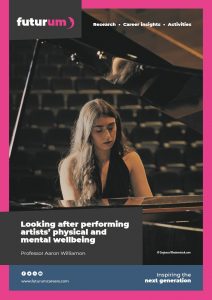
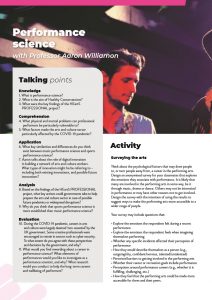


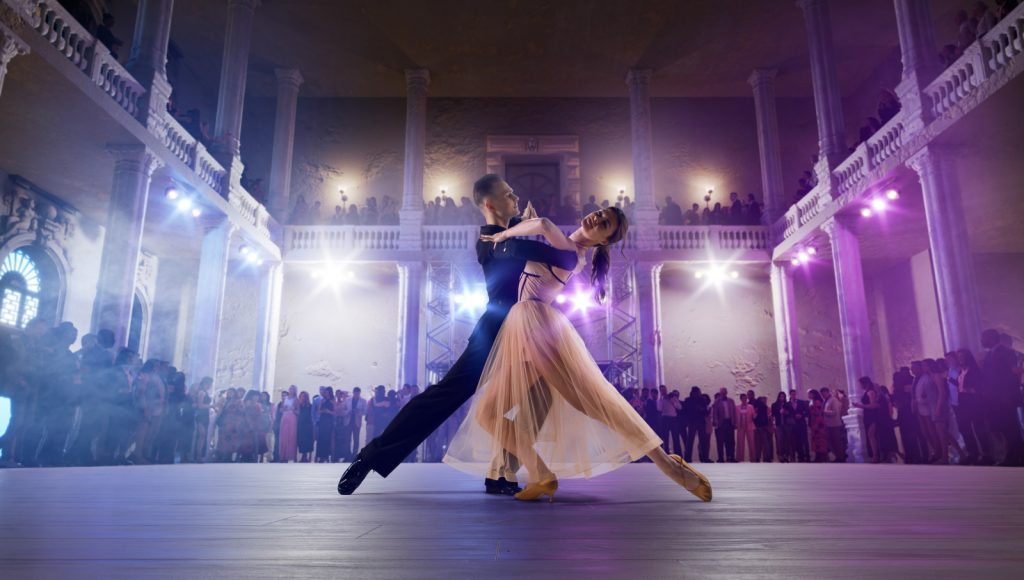
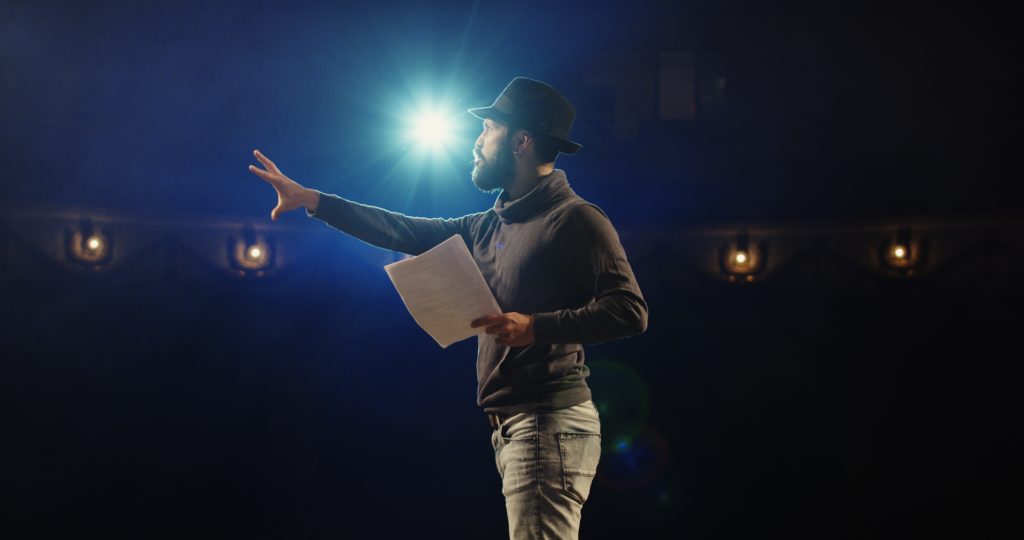
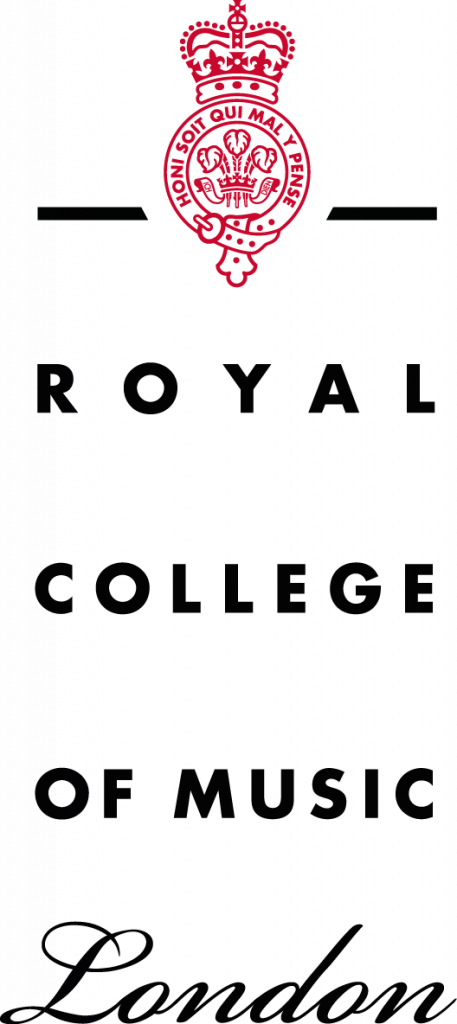
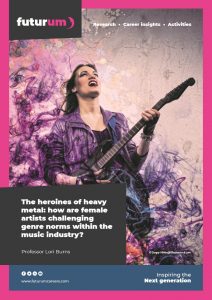
Dear Professor Williamon,
I hope this email finds you well. My name is Aaran Vijayakumaran and I am a PhD student in cell biology and AI at the University of Cambridge. Alongside my research, I am a passionate musician with a strong interest in the intersection of neuroscience, music, and the arts.
Your work at the Centre for Performance Science, particularly its focus on studying skilled performers and their well-being, deeply resonates with me. I am especially keen to explore how neuroscience and scientific methodologies can enhance our understanding of performance practices and optimize training and health for performers.
Would it be possible to discuss potential opportunities for collaboration or ways to contribute to the exciting initiatives at CPS?
Thank you for your time and consideration.
Best regards,